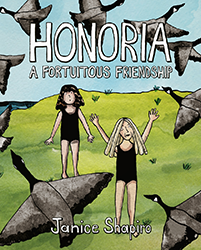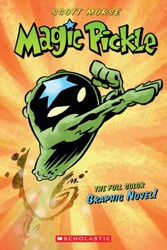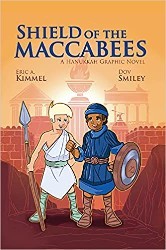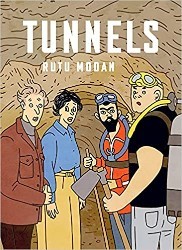In Ziggy Hanaor’s and Benjamin Phillips’s new graphic novel for young adults and older, middle-grade readers, a boy named Benjy spends the day with his grandmother in New York City. Their trip through different neighborhoods in Brooklyn and Manhattan is not without anguish; Bubbe Rosa isn’t the warm and kindhearted figure presented in many other stories about grandparents. Then again, maybe she is, but her past experiences have put her on guard, stifling the affection that Benjy deserves. Text and pictures both reveal the complexities of Bubbe’s life, and she emerges as a unique woman who is emblematic of her era.
At the beginning of the novel, Bubbe suggests that she and Benjy go out on a shopping excursion, so that she can prepare kugel, brisket, and gefilte fish. With a nostalgic choice of foods and Bubbe’s appearance in a bulky winter coat and old-fashioned scarf, Hanaor and Phillips lead readers to anticipate a nice trip through the Lower East Side. Instead, almost every interaction Bubbe has with the community brims with hostility. Young people are rude, a store clerk’s hipster clothing and tattoos are “disgusting,” and, worst of all, her young grandson does not “even know what it means to be Jewish.” Benjy’s patience with her is almost frustrating.
Gradually, Benjy’s understanding response begins to make sense. In a reverse of many illustrated books with flashbacks to the past, black-and-white pictures change to color when Bubbe recalls her earlier life. She is a Holocaust survivor, a fact initially presented with cruel irony. After she lashes out at a group of boys who, she claims, have learned nothing in school, the scene shifts to her own school days in Germany. As her class conjugates Latin verbs together, the principal enters to taunt them in German: “Get out you dirty Jews! We don’t want you here.” It becomes clear that the classical education she held up as superior to contemporary education was useless as the Nazis took power.
Bubbe reminisces sadly about her late husband, Benjy’s Zayde Joe, but she also remembers another admirer, Gershon the baker. Much is left unsaid about their friendship; throughout the book, silences and gaps convey almost as much as words. Although Bubbe sometimes seems disoriented (“This isn’t the Upper West Side. Oy, they got the train wrong”), her confusion is often rooted in reality. With sushi shops and tattoo parlors replacing older establishments, her anxiety about a lost world seems logical, even if it appears questionable to young readers. Bubbe, in other words, is looking for alte zachen, old things. But whether searching her refrigerator or trying to find a butcher with acceptable prices, her quest to recapture better times will always result in disappointment.
Phillips’s delicate colors and fine details illustrate the richness of city life. Two sisters arguing on a train, a couple dancing together, and immigrants’ first view of the Statue of Liberty — these are all images that Bubbe conjures while looking back over the years. In one full-color scene that integrates past and present, she comes to terms with the inevitability of change. As the book ends, with grandmother and grandson against a New York City skyline, newness does not seem so threatening, after all.
Emily Schneider writes about literature, feminism, and culture for Tablet, The Forward, The Horn Book, and other publications, and writes about children’s books on her blog. She has a Ph.D. in Romance Languages and Literatures.





